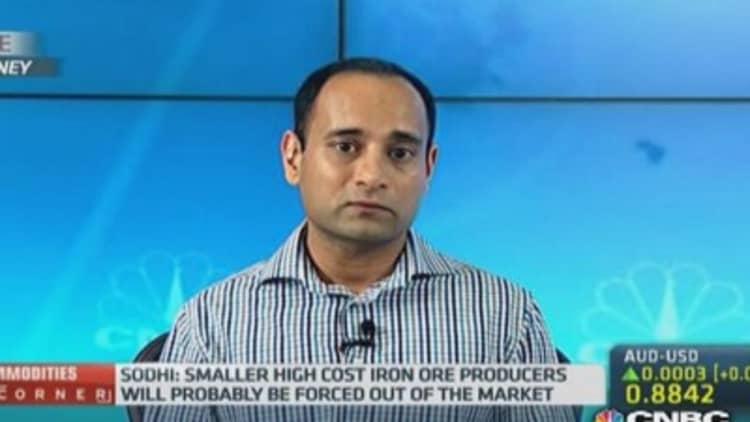BHP Billiton aims to cut its iron ore production costs by more than 25 percent and squeeze more tons from its mines as it aims to overtake rival Rio Tinto as the world's cheapest producer, the world's largest miner said on Monday.
BHP, the No. 3 iron ore producer behind Brazil's Vale and Rio Tinto, outlined the cost-cutting and expansion plan even as iron ore prices have slumped 42 percent this year, as it sees demand picking up over the medium term.
"We will continue to squeeze the lemon because at the end of the day it's just so value accretive," Jimmy Wilson, the head of BHP's iron ore division, told reporters in a video conference ahead of an analyst tour of its West Australian mines.
The focus of mining companies has shifted towards cost cutting as iron ore prices have dropped from about $190 a ton in 2011 to less than $80 now, sinking to five-year lows as supply growth from the major miners has exceeded demand growth by more than two to one.
Read MoreIron ore could drop another $10
BHP said it could boost its annual output rate from 225 million tons at end-2013 to 290 million by June 2017.
At the same time, it expects to cut the cost of that expansion to about $30 per ton, or overall capital spending of about $2 billion, which is well below a previous estimate of under $50 a ton.
It is aiming to cut production costs, excluding freight and royalties, to less than $20 a ton in the medium term, down from $27.50 for financial year 2014.
"The name of the game in the past was volume above and before everything else. Now cost is much more important and we are finding a lot more opportunities," Wilson said.
Read MoreVale CEO: How we're staying competitive
BHP hopes to achieve the lower costs by cutting its spending with contractors, chopping the headcount by a few hundred people and benefiting from economies of scale, and by focusing on mining around its four existing hubs.
"With annual sustaining capex of approximately $5 per ton over the next five years, we aim to be the lowest-cost supplier to China on an all-in cash basis," Wilson said.

Foot on the accelerator
He said the company would continue to accelerate production even if iron ore prices keep falling, which analysts expect to happen over the next few years.
"We continue to see healthy demand growth for iron ore in the mid-term as Chinese steel production is expected to increase by approximately 25 percent to between 1.0 and 1.1 billion tons in the early to mid-2020s," he said.
Read MoreSteel industry on subsidy life-support as China economy slows
Falling prices have already hit margins across the industry and made many smaller mining companies unprofitable.
Wilson said 40 million tons of Chinese production have already exited the market and that new low-cost supply from Australia will displace output from other regions such as Iran, Mongolia and Kazakhstan.
By 2015, major producers in Brazil and Australia will account for 1.15 billion tons or 83 percent of world seaborne ore trade, according to Australian government data, up from 71 percent just three years before.
Wilson said the closure of smaller producers was an unfortunate side-effect of market conditions.
Read MoreWhy the tide is against the iron ore giants
"We don't take any joy from people losing their jobs because a company closes, but at the end of the day charity starts at home," he said. "We have to run our business as hard and as well as we physically can. We have a responsibility to our shareholders."

